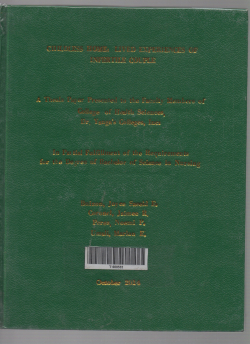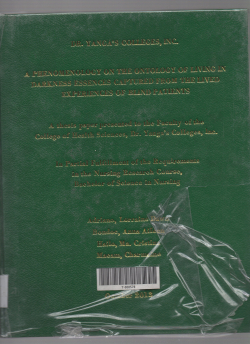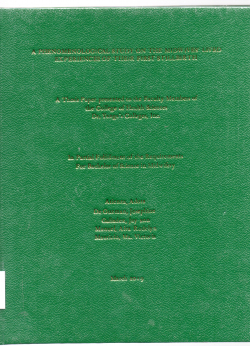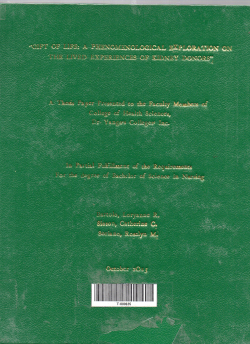CHILDLESS HOME: LIVED EXPERIENCES OF INFERTILE COUPLE

Type
Thesis
Authors
Category
CHS
[ Browse Items ]
Subject
Infertility
Abstract
Abstract
Relevant to the concept that family is the most fundamental unit in the society, every married couple desires to have their own children. However, not all married couples are blessed with children which is referred to as infertility. An average of 10% of the global reproductive-age population is unable to get pregnant or carry a pregnancy to term. In the Philippines, one out of 10 Filipino couples is facing the challenge of conceiving a child. In this relation, the degree of effects of infertility urged the researchers to conduct this study. In this study, the lived experiences of couples who are infertile were evaluated comprehensively which led to understanding the nature of such problem. The researchers made use of a qualitative phenomenological research design utilizing Hancock’s seven steps approach. Co-researchers selection was guided by the collective principles of snow ball and purposive sampling. Eight (8) Infertile couples from Bulacan satisfied the inclusion criteria set by the researchers which include: (a) couple who experienced infertility for at least five years regardless of the cause of infertility, (b) infertile couple should be 30 years old and above, and (3) couple living together and are willing to be part of the study. Verbal data were then transcribed and an iterative process of coding and classifying data was employed to develop categories. Transcripts from the focused group and field notes were analyzed and coded into categories and sub-categories, using content analysis. Trustworthiness of research results was established by identification of researchers’ pre-conceived nQtions to prevent contamination and through member checking. Four emergent themes were formulated representing the lived experiences of infertile couple which include (1) jjalf- Wished Family which signifies how the couple expressed their perception of an ideal family, the dream of rearing their own children, (2) Qbtrusive Impediments implies the initial hardships and challenges that have obtrusively impeded the infertile couple to recognize that their relationship as a couple is considered already a family unit, (3) fanaging Strategies describes the infertile couples’ coping strategies that significantly help them to readily manage the struggles brought about by the phenomenon, and (4) mbracing Attitudes which clearly describes how the couple embraces their situation through the mutual appreciation of each other regardless whether they will be having children or not. Based on the research findings, it is then concluded that a strong bond and support for each other provided the most significant strategy to manage the strains caused by infertility. It was reiterated that their relationship is strengthened through constant communication and coordination and the essence of being married is centered on the concept of commitment, that no matter what ordeal they encounter along the road to building a family, they would face it together. In addition, infertile couple managed to cope by strengthening their spiritual faith in God. On the basis of the findings, creation of support group is then recommended to help lessen the feeling of depression of the infertile couples. Nurses therefore should conduct health education campaigns to help the public be more aware of the physical, emotional, and psychological struggles of the couple thereby societal acceptance will be facilitated.
Relevant to the concept that family is the most fundamental unit in the society, every married couple desires to have their own children. However, not all married couples are blessed with children which is referred to as infertility. An average of 10% of the global reproductive-age population is unable to get pregnant or carry a pregnancy to term. In the Philippines, one out of 10 Filipino couples is facing the challenge of conceiving a child. In this relation, the degree of effects of infertility urged the researchers to conduct this study. In this study, the lived experiences of couples who are infertile were evaluated comprehensively which led to understanding the nature of such problem. The researchers made use of a qualitative phenomenological research design utilizing Hancock’s seven steps approach. Co-researchers selection was guided by the collective principles of snow ball and purposive sampling. Eight (8) Infertile couples from Bulacan satisfied the inclusion criteria set by the researchers which include: (a) couple who experienced infertility for at least five years regardless of the cause of infertility, (b) infertile couple should be 30 years old and above, and (3) couple living together and are willing to be part of the study. Verbal data were then transcribed and an iterative process of coding and classifying data was employed to develop categories. Transcripts from the focused group and field notes were analyzed and coded into categories and sub-categories, using content analysis. Trustworthiness of research results was established by identification of researchers’ pre-conceived nQtions to prevent contamination and through member checking. Four emergent themes were formulated representing the lived experiences of infertile couple which include (1) jjalf- Wished Family which signifies how the couple expressed their perception of an ideal family, the dream of rearing their own children, (2) Qbtrusive Impediments implies the initial hardships and challenges that have obtrusively impeded the infertile couple to recognize that their relationship as a couple is considered already a family unit, (3) fanaging Strategies describes the infertile couples’ coping strategies that significantly help them to readily manage the struggles brought about by the phenomenon, and (4) mbracing Attitudes which clearly describes how the couple embraces their situation through the mutual appreciation of each other regardless whether they will be having children or not. Based on the research findings, it is then concluded that a strong bond and support for each other provided the most significant strategy to manage the strains caused by infertility. It was reiterated that their relationship is strengthened through constant communication and coordination and the essence of being married is centered on the concept of commitment, that no matter what ordeal they encounter along the road to building a family, they would face it together. In addition, infertile couple managed to cope by strengthening their spiritual faith in God. On the basis of the findings, creation of support group is then recommended to help lessen the feeling of depression of the infertile couples. Nurses therefore should conduct health education campaigns to help the public be more aware of the physical, emotional, and psychological struggles of the couple thereby societal acceptance will be facilitated.
Number of Copies
1
| Library | Accession No | Call No | Copy No | Edition | Location | Availability |
|---|---|---|---|---|---|---|
| Main | 593 | TB8689 2014 | 1 | Yes |




